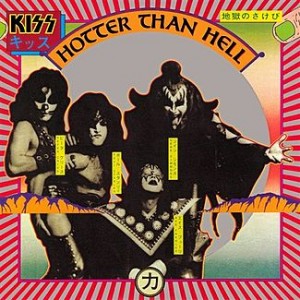It is nearly impossible to imagine a world without Kiss at this point. Whether you are a full-on soldier in the Kiss Army or you can’t stand them at all, you are always made aware that they exist even now. Gene Simmons’ combination of business savvy and brazen brand-whoring assures that. In October of 1974, however, things were much more tentative.
A small group of fans had gravitated to that weird first album of theirs, more than a passing nod to one of Simmons’ idols The Beatles. The demonic kabuki makeup and glitter-bomb logo told a different story. Even in the rough ‘n ready world of hard rock in the early 1970s, the eponymous debut rougher, which is a polite way of saying it was recorded on the relative cheap and sounded that way. Even with the benefit of a little more money and a better recording studio, 1974’s Hotter Than Hell still wasn’t going to become an audiophile’s demo disc for their “killer stereo setup.”
 The material that would comprise Hotter Than Hell would come from several sources, with two of the record’s most notable tracks coming from guitarist Ace Frehley, “Parasite” and “Strange Ways.” The former would become a favorite in the band’s live show and would be covered by several bands in later years. Frehley would not sing them, and in fact he wouldn’t sing on any Kiss album until 1977’s Love Gun, which featured his track “Shock Me.” It is an ironic turn that, of the solo series of albums that came later, only Frehley’s would produce a hit, a cover of “New York Groove.” Not a bad reversal of fortune for someone who refused to sing because of performance anxieties.
The material that would comprise Hotter Than Hell would come from several sources, with two of the record’s most notable tracks coming from guitarist Ace Frehley, “Parasite” and “Strange Ways.” The former would become a favorite in the band’s live show and would be covered by several bands in later years. Frehley would not sing them, and in fact he wouldn’t sing on any Kiss album until 1977’s Love Gun, which featured his track “Shock Me.” It is an ironic turn that, of the solo series of albums that came later, only Frehley’s would produce a hit, a cover of “New York Groove.” Not a bad reversal of fortune for someone who refused to sing because of performance anxieties.
Another song, the notorious “Goin’ Blind” was written by Simmons and Stephen Coronel and dated back to their years in predecessor band Wicked Lester. The song itself is about a 93-year-old man, an underage girl, and their forbidden love. Ick.
There wasn’t much at all going on that was fortuitous about the recording of Hotter Than Hell. The band begrudgingly followed producers Kenny Kerner and Richie Wise to Los Angeles to record. Having been dyed-in-the-black-leather-unitard New Yorkers up to then, the adjustment to California couldn’t have started off worse. On his first day in town, Paul Stanley’s guitar was stolen. It was a harbinger of things to come.
The record was recorded at a studio that technically was better than the facilities for their first album, yet managed to sound just as dank and threadbare as Kiss’ first.
Kiss’ label Casablanca Records initially was distributed by Warner Bros. Records, home to another shock-rocker Alice Cooper (which is a significant point — more later). When that deal went under, before the release of Hotter Than Hell, so did the infrastructure to promote the record with full force. The album went out with the single “Let Me Go, Rock And Roll” and faltered. The band always knew that their greatest strength was their over-the-top live show and had a belief that the initial weak numbers from sales would steadily grow if they were given time to connect with the audience. Even at this point, Kiss was known as intense road-dogs. Yet those lagging sales acted like an anchor, and when the record was deemed a loser, the band was summoned back to the studio and off the road.
In the modern business model, that would have been the end of Kiss. Actually, the lukewarm numbers for the debut would have been the end, as new acts today will not be given time to grow the fan base. Yet Casablanca label head Neil Bogart was determined not to let it all go under. The band would go back and begin work on what would become Dressed To Kill, which would also underperform. Yet one track from the album would become the band’s anthem, a staple of their live show, and when it appeared on the subsequent Alive! album, everything changed. The track was “Rock ‘n Roll All Nite.”
Now Kiss was one of the biggest bands in the United States, thanks to a hit song pulled from a live album, a rare event in rock history. (Humble Pie’s guitarist Peter Frampton would do it with “Show Me The Way” from the massive success of the Frampton Comes Alive record. Other than those, not many other live album cuts come to mind for examples.) The next time Kiss went into the studio, it would be with their biggest budget, in a state-of-the-art facility, with Bob Ezrin, Alice Cooper’s producer, behind the boards. Destroyer would become the band’s most-beloved album and saw the characters the members embodied become rock and roll superheroes. 1977’s Love Gun continued their march toward omnipresence in popular culture.
Oh, and thanks to all this new-found mojo, the band’s previous albums started selling…a lot. Hotter Than Hell was certified gold in 1977.





Comments